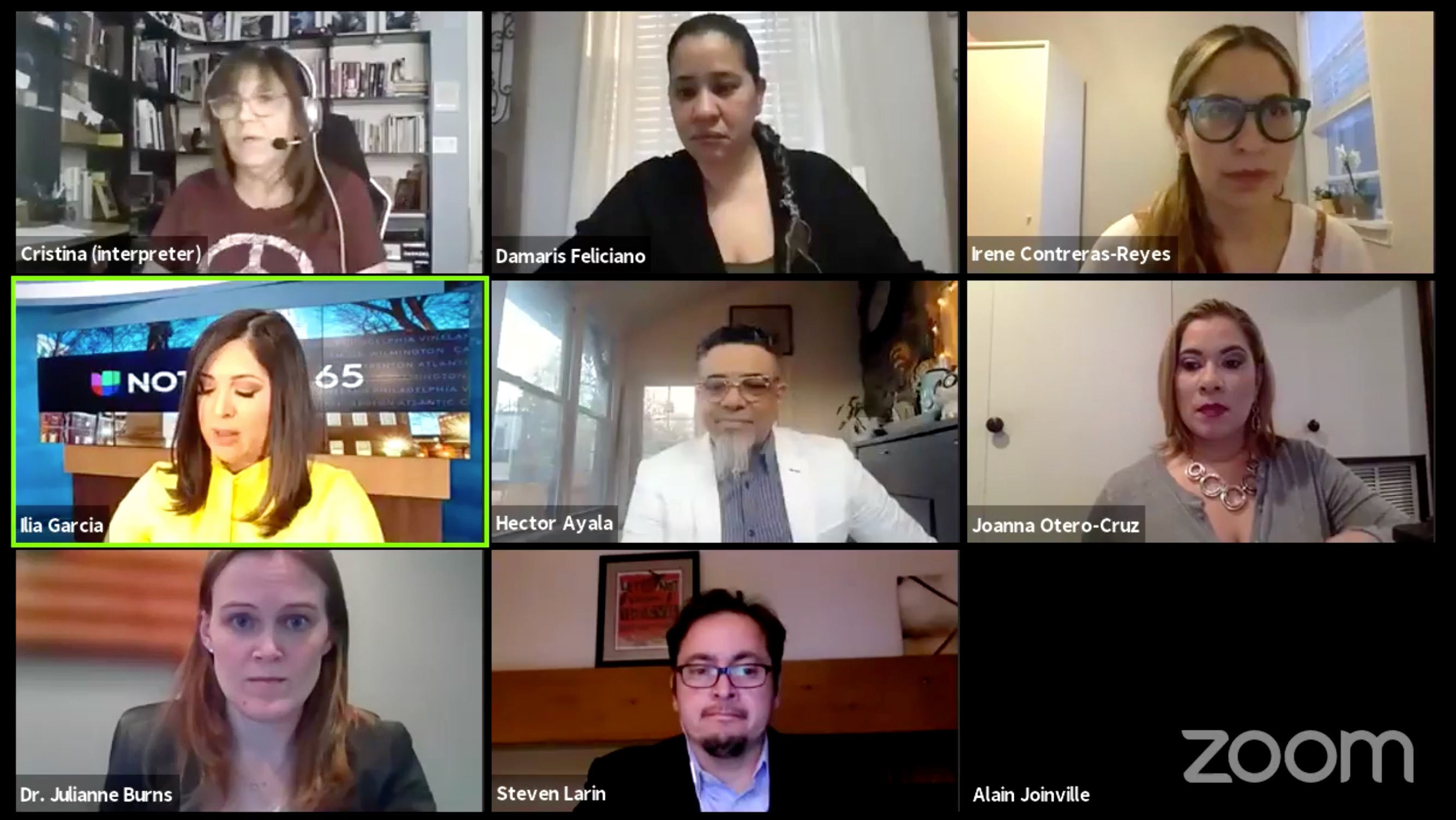
City of Philadelphia holds first Latino roundtable on Covid-19 vaccine, four months into rollout
Panelists discussed important topics like access for immigrant and undocumented communities to the vaccine.
The City of Philadelphia presented its first Latino-focused roundtable in partnership with Univisión 65 on April 6, to discuss the most pressing concerns that Latinos in Philadelphia have expressed in the nearly four months since the vaccine first began distribution in the city.
Roundtable participants included Dr. Julianne Burns MD with the Philadelphia Department of Public Health, Hector Ayala with the Hispanic Community Services Counseling, Immigration Attorney Steven Larin, and Joanna Otero-Cruz.
While there was no Latino or Spanish-speaking expert on the vaccine, the city told AL DIA that due to a last-minute complication, Dr. Laura Hribar couldn’t attend the roundtable. Instead Dr. Burns was the City’s vaccine expert, but due to further complications, the on-screen Spanish-language interpretation didn’t work.
A summary of Dr. Burns’ responses were offered in Spanish after the vaccine portion of the panel.
A recap is also provided below and available in Spanish here.
Nevertheless, the panel discussed vital information and answers to concerns that have in part, contributed to decreased vaccination rates among the Hispanic and Latino population.
Apart from general vaccination information, the panel discussed access to immigrant and undocumented communities, how to get the vaccines in Philadelphia, and the FEMA sites available, both in Center City and in North Philadelphia at Esperanza. The end of the panel discussed mental health services that are available.
First, Dr. Burns answered concerns on how quickly the vaccine was developed, since many people have doubts over the vaccine approval process.
“With any vaccine in development, it is tested in multiple clinical trials that include tens of thousands of people. With the vaccines that are currently in use in the United States, these vaccines were tested in trials for at least three months before they were given the authorization to use, and the vast majority of effects after vaccines occur within the first three months of vaccination, and so those vaccines were tested during this time, and all were shown to be safe,” Dr. Burns said.
She added that the vaccines in use are continued to be monitored for safety by the CDC to ensure no rare side effects are detected. She said that although the development was “streamlined,” this was possible because of large-scale investment, along with existing technologies for vaccines that made the process quicker.
As for concerns over getting seriously sick after receiving the vaccine, Dr. Burn clarified further.
“The benefit of getting vaccinated is much greater than any risk of the vaccine. As everyone knows, Covid can be a very severe disease and has caused a lot of pain and bad outcomes in our community, and so really the best chance at protection against Covid is to get the vaccine. And by getting the vaccine you are also protecting yourself, your family, yourself, and your neighbor into your entire community.”
If someone has specific concerns related to an existing health condition, she said it’s best to consult a doctor. Vaccines don’t interfere with any medicines you might be taking, but those with health conditions are predisposed to get very sick from COVID-19. Therefore, it’s much safer to get the vaccine for protection.
As for vaccine preference, Dr. Burns said there isn’t one before emphasizing the safety of the three currently available.
“They are all very effective equally in preventing hospitalizations, which is the most important thing in terms of protection from the Covid virus,” she said.
When asked if people can choose which vaccine they receive, Burns said that currently, only specific sites that get the vaccine will have one vaccine available.
“We hope that in the coming months, more vaccines will be available,” she said.
Symptoms, Burns said, are normal and to be expected.
“These symptoms will only last for one or two days and then you will feel much better. These symptoms are much less than you would experience if you really had the Covid virus, and were very sick from Covid. The vaccine does not contain the Covid virus. You cannot get Covid from the Covid vaccine,” she said.
Still, there are some incredibly rare side effects of an allergic reaction that can happen after the vaccine.
“They only occurred in a few people per million people that have gotten the vaccine, and that’s the reason why we ask you to stay for 15-30 minutes after receiving the vaccine to monitor for any reactions,” said Burns.
If this rare event were to happen, Dr. Burns said there is medical equipment on-site, and if it is necessary, one would be taken to the emergency department to receive care.
To end her segment, Dr. Burns answered questions on the future of child vaccinations.
RELATED CONTENT
“The companies who develop the vaccines are doing trials in children right now to determine the correct dose for the children to get the vaccine,” she said.
The hope is that vaccines will be available to children as soon as the Summer, but at least in the Fall.
One of the most pressing questions people have is if it will affect the path to citizenship in any way.
“Yes, it is safe,” said Larin. “A person who is undocumented has every right and is required to go get vaccinated.”
Many, he said, also fear the risk of deportation.
The Department of Homeland Security (DHS) has clearly said that deciding to vaccinate is not going to affect one’s status, and they will not be targeted.
“Again, the Department of Homeland Security (DHS) has clearly stated that they are not going to conduct operations to arrest people at vaccine centers or doctors' offices, hospitals, or emergency medical sites. They are not going to arrest people who are in these places, because again, the federal government wants people to get vaccinated,” said Larin.
Privacy is another concern.
State and federal governments are keeping records of those getting vaccinated, but only for health-related data to monitor vaccination levels and vaccination rates in certain zip codes.
Larin stressed that vaccine sites will not share information with bodies like ICE.
“Many immigrants have lived these last years with a lot of fear... but because of the emergency that we fear, because of the pandemic, the federal government has been very clear, that it is not going to have any impact on the immigration process, that they are not going to continue with raids and arrests at vaccination sites,” he said.
To end the roundtable, Dr. Ayala spoke on Mental health resources available in the city.
He emphasized that while alternative routes like telehealth visits have become widely utilized, there is still an issue of capacity limits, language barriers, and knowledge for what to look out for in one’s family.
“Different ages, at different stages of life, present symptoms in different ways, for example[...]"As a parent, what we should be watching out for is not just what the kids are saying, but what the kids are doing or not doing,” he said.
The full discussion can be viewed here:












LEAVE A COMMENT: